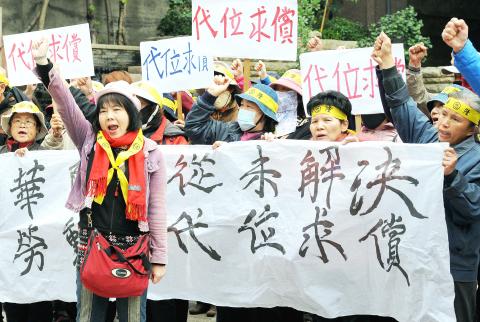Money repaid by workers before 2012 in line with the then-Council of Labor Affairs’ request at the time will be returned in view of the latest High Administrative Court ruling against the government in its bid to recoup loans paid to factory workers in the 1990s when their employers went bust, Premier Jiang Yi-huah (江宜樺) said yesterday.
The case dates back to the 1990s, when more than 1,000 workers were laid off without severance or retirement pay.
The government established a job security fund to issue loans defined as re-employment assistance for the workers.

Photo: Chu Pei-hsiung, Taipei Times
To recover unpaid loans, the then-Council of Labor Affairs filed lawsuits in 2012 against loan recipients who had not repaid the debts, sparking anger among displaced workers, their supporters and activists, who have staged highly visible protests over the past year.
On March 7, the court ruled against the ministry, saying the loans were, in effect, compensation to the laid-off workers. It also found that the deadline for the government to pursue the matter — January 2006 — had long passed.
On Monday, the ministry said that it would not appeal the ruling, adding that it will drop similar cases against other former factory workers and that those who have repaid the loans will have their money returned.
Payments would also be returned to former workers who paid off the loans before 2012, Jiang said yesterday when answering questions from Chinese Nationalist Party (KMT) Legislator Lu Yu-ling (呂玉玲) at the Legislative Yuan.
Jiang said the decision to return the money to workers who were “more law-abiding” was made on Thursday night, on the principles of equality.
“Workers who were more law-abiding and returned the funds early should not have to suffer different treatment,” he said.
Meanwhile, Minister of Labor Pan Shih-wei (潘世偉) said the Ministry of Labor was leaning toward paying back the funds through the Employment Security Fund, but that the decision depends on the results of an Employment Security Fund management committee meeting.
Pan said that the ministry still considered the loans as such and not subrogation payments, meaning the government is not responsible for claims against the shuttered businesses.
Pan added that since the statute of limitations had expired, trying to reclaim the funds would be unlawful.

ANOTHER EMERGES: The CWA yesterday said this year’s fourth storm of the typhoon season had formed in the South China Sea, but was not expected to affect Taiwan Tropical Storm Gaemi has intensified slightly as it heads toward Taiwan, where it is expected to affect the country in the coming days, the Central Weather Administration (CWA) said yesterday. As of 8am yesterday, the 120km-radius storm was 800km southeast of Oluanpi (鵝鑾鼻), Taiwan’s southernmost tip, moving at 9kph northwest, the agency said. A sea warning for Gaemi could be issued tonight at the earliest, it said, adding that the storm is projected to be closest to Taiwan on Wednesday or Thursday. Gaemi’s potential effect on Taiwan remains unclear, as that would depend on its direction, radius and intensity, forecasters said. Former Weather Forecast

As COVID-19 cases in Japan have been increasing for 10 consecutive weeks, people should get vaccinated before visiting the nation, the Centers for Disease Control (CDC) said. The centers reported 773 hospitalizations and 124 deaths related to COVID-19 in Taiwan last week. CDC Epidemic Intelligence Center Director Guo Hung-wei (郭宏偉) on Tuesday said the number of weekly COVID-19 cases reported in Japan has been increasing since mid-May and surpassed 55,000 cases from July 8 to July 14. The average number of COVID-19 patients at Japan’s healthcare facilities that week was also 1.39 times that of the week before and KP.3 is the dominant

The Chinese Communist Party’s (CCP) working group for Taiwan-related policies is likely to be upgraded to a committee-level body, a report commissioned by the Mainland Affairs Council (MAC) said. As Chinese President Xi Jinping (習近平) is increasingly likely to upgrade the CCP’s Central Leading Group for Taiwan Affairs, Taiwanese authorities should prepare by researching Xi and the CCP, the report said. At the third plenary session of the 20th Central Committee of the CCP, which ended on Thursday last week, the party set a target of 2029 for the completion of some tasks, meaning that Xi is likely preparing to

US-CHINA TRADE DISPUTE: Despite Beijing’s offer of preferential treatment, the lure of China has dimmed as Taiwanese and international investors move out Japan and the US have become the favored destinations for Taiwanese graduates as China’s attraction has waned over the years, the Ministry of Labor said. According to the ministry’s latest income and employment advisory published this month, 3,215 Taiwanese university graduates from the class of 2020 went to Japan, surpassing for the first time the 2,881 graduates who went to China. A total of 2,300 graduates from the class of 2021 went to the US, compared with the 2,262 who went to China, the document showed. The trend continued for the class of 2023, of whom 1,460 went to Japan, 1,334 went to